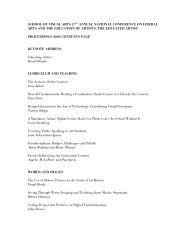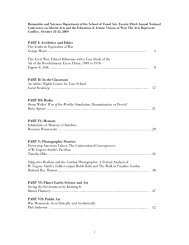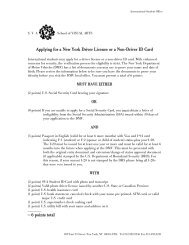SECTION 1 - via - School of Visual Arts
SECTION 1 - via - School of Visual Arts
SECTION 1 - via - School of Visual Arts
You also want an ePaper? Increase the reach of your titles
YUMPU automatically turns print PDFs into web optimized ePapers that Google loves.
Memories <strong>of</strong> the intellectual past should in their theoretical and cognitive obsolescence be<br />
forgotten, so implied Sir Frederick Charles Bartlett (1886-1969) in 1932 with the publishing <strong>of</strong><br />
his ground breaking work entitled Remembering: A Study in Experimental and Social<br />
Psychology. In Remembering he proposed a theory <strong>of</strong> memory that is still applicable, linking<br />
memory directly to perception, stating that memory is as creative and susceptible to error as our<br />
processes <strong>of</strong> perception.<br />
Keep in mind that our processes <strong>of</strong> perception are determined by our processes <strong>of</strong> cognition<br />
and cognition is determined first by ones bio-brain system architecture and secondly by ones<br />
acculturation in a tradition in memory and cognition that either affirms or negates our biobrain<br />
systems inherent potential.<br />
John F. Kihlstrom in his paper entitled: “Memory, Autobiography, History,” quotes Bartlett,<br />
Maurice Halbwachs (1877-1945) and E<strong>via</strong>tar Zerubavel whose book Social Mindscapes was<br />
published in 1997. Each speaks to the formative influence <strong>of</strong> acculturation and socialization in<br />
all that comprises memory. Bartlett wrote that:<br />
Social organization gives a persistent framework into which all detailed recall<br />
must fit, and it very powerfully influences both the manner and the matter <strong>of</strong><br />
recall.<br />
He also wrote that:<br />
Remembering is an act <strong>of</strong> communications, <strong>of</strong> information sharing and selfexpression,<br />
as well as an act <strong>of</strong> information retrieval. Accordingly our memories<br />
<strong>of</strong> the past are shaped by the interpersonal context in which they are encoded,<br />
stored and retrieved.<br />
Halbwachs in (1925) argued that:<br />
The individual calls recollections to mind relying on the framework <strong>of</strong> social<br />
memory . . . there are surely many facts and many details . . ., that the<br />
individual would forget if others did not keep their memory alive for him. But,<br />
on the other hand society can live only if there is sufficient unity <strong>of</strong> outlooks<br />
among the individuals and groups comprising it. . . . This is why society tends<br />
to erase from its memory all that might separate individuals, or that might<br />
distance groups from each other.It is also why society, in each period,<br />
rearranges its recollections in such a way as to adjust them to the variable<br />
conditions <strong>of</strong> its equilibrium.<br />
I would argue that Halbwachs overlooks those in society that empower themselves by<br />
perpetuating such xenophobic-xenotropic divisions as race, class, ethnicity and religion within<br />
the larger society.<br />
Many today argue with Halbwachs that memory is a micro-macro-social-construction, that the<br />
concerns <strong>of</strong> the present shape the past and therefore our memory. In Social Mindscapes<br />
Halbwachs points out that it is others that help us as much to forget as to remember,<br />
39








